Guillaume de Lorris
The Romance of the Rose (Le Roman de la Rose)
Part IV: Chapters XXI-XXXII
Translated by A. S. Kline © Copyright 2019 All Rights Reserved.
This work may be freely reproduced, stored and transmitted, electronically or otherwise, for any non-commercial purpose. Conditions and Exceptions apply.
Contents
- Chapter XXI: The Lover flees in haste
- Chapter XXII: Reason admonishes the Lover
- Chapter XXIII: The Lover rejects Reason’s advice
- Chapter XXIV: The Lover seeks out Friend
- Chapter XXV: Friend gives him good counsel
- Chapter XXVI: The Lover begs Resistance to show mercy
- Chapter XXVII: Pity and Openness plead on his behalf
- Chapter XXVIII: Fair-Welcome leads the Lover to the Rose
- Chapter XXIX: The Lover kisses the Rose
- Chapter XXX: Jealousy scolds Fair-Welcome
- Chapter XXXI: Fear and Shame chide Resistance
- Chapter XXXII: Jealousy’s tower
- Chapter XXXII: The Lover laments his fate
- Chapter XXXII: Pity and her company arrive to save the Lover
- Afterword: The Continuation
Chapter XXI: The Lover flees in haste
Here doth Resistance, the villain,
Drive the Lover from the garden,
With a large club for a guerdon,
Like a madman, or a felon.
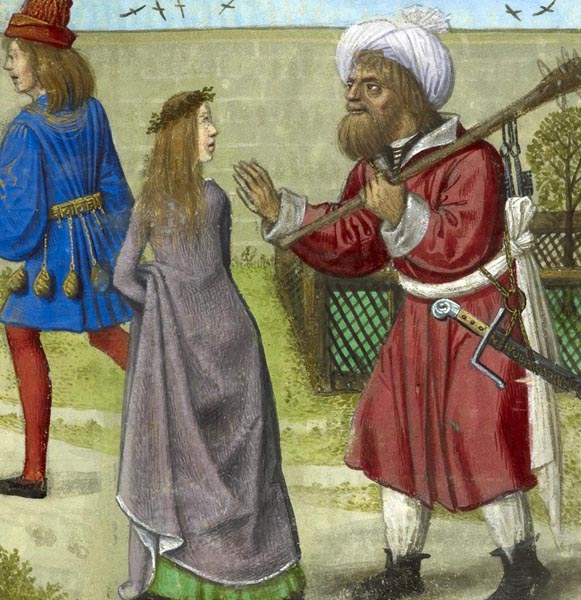
‘Resistance Expels the Lover’
THERE I dared no longer remain,
For that great swarthy wretch again,
Menaced me, launching his attack.
He made me clear the hedge, alack,
In great haste and filled with fear.
He shook his head, looming near,
And said that if I dared return,
He’d surely do me an evil turn.
Fair-Welcome too, then took flight;
Dismayed, I watched him out of sight,
And all ashamed, did now repent
Of telling him all my true intent.
For, all my folly I did remember,
And felt that my every member
Was given o’er to grief and pain
And martyrdom, angered again
At failing the hedge to pass by;
Ill comes to him who love doth try;
Let him not think that he doth know
Anguish, till he has tried love so.
Love was acquitting himself well
Regarding the trouble he did tell
Me of; no heart could ever speak,
Nor the mouth of man, in a week,
One quarter part of my misery,
So great that my heart nigh left me,
When I recalled the Rose, how she
Must now remain so far from me.
Chapter XXII: Reason admonishes the Lover
How Reason, whom God doth love,
Descends from her tower above,
To punish and seize the Lover,
For pursuing foolish Love ever.
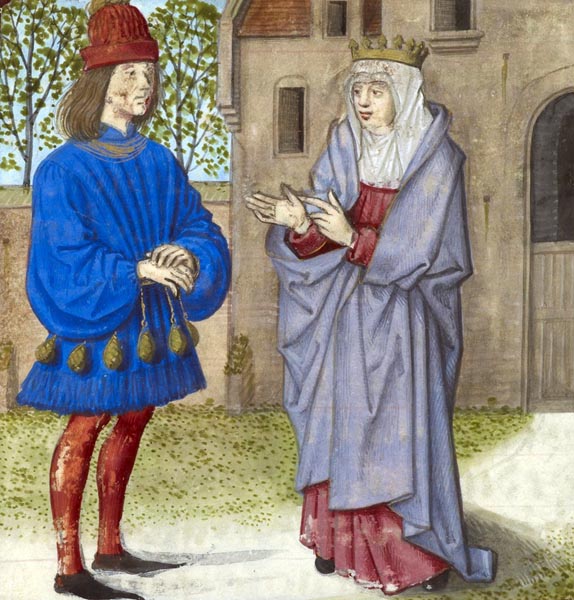
‘Reason Admonishes the Lover’
I WAS in this state, till, by and by,
I was seen by that lady, on high,
Who keeps a watch from her tower,
And spied me where I did cower:
Reason, such is that lady’s name,
Now descended from that same,
And advanced towards me swiftly.
She was not young, and yet she
Was not aged, nor short, nor tall,
Nor fat, nor thin, as I now recall;
But her eyes were bright, in her face,
As if two stars glittered in place,
And on her head she wore a crown;
Thus she appeared of high renown.
By her aspect, and by her eyes,
She seemed one wrought in Paradise.
For Nature surely could not know
How to create a work formed so.
Know, if the letter doth not lie,
That God made her, to the eye,
In His semblance and His image,
And He gave her this advantage,
That she has power such that she
Can protect a man from folly,
So long as he believes in her.
While I did lament and suffer,
Reason began to speak to me:
‘Fair friend, childishness and folly
Bring you but suffering and dismay.
Ill was the hour, of this fair May,
That to your heart such joy conveyed.
And ill when you, in the cool shade
Of the garden, Idleness saw,
Who with her key did ope the door.
A fool is he who knows Idleness,
For her acquaintance is perilous.
She’s betrayed, and has deceived you;
For Love would ne’er have noticed you,
Had she not led you, at her leisure,
Into the fair garden of Pleasure.
If you’ve played the foolish lover,
Do what you can now to recover,
And take good care not to believe
The counsel of folly you’ll receive.
The bravest folly’s self-correction.
If youth commits a foolish action,
One should not wonder too greatly.
Now I would counsel you, directly,
Cease now to remember this love,
That weakens you, and doth prove
A torment that overcomes you,
Else your health will be lost to you;
Nor do I see some other cure,
For fell Resistance makes war
Upon you, and it brings him joy.
Why upon him your wits employ?
And then, Resistance is but tame
Compared to my daughter Shame,
Who guards and defends the Roses,
As one who her will imposes,
And her you should truly fear;
None worse for you could appear.
Ill-Talk accompanies these two,
Who lets none touch; ere they do,
The thing is known in every place.
Harsh folk it is then that you face.
So now consider, carefully too,
Which course tis better to pursue,
Whether to leave off or to follow
That which makes you live in sorrow.
The ill that has Love for a name,
Naught but sheer folly is that same.
Folly! God help me, truth I tell.
The man that loves does nothing well,
In this world wins nary a thing;
The clerk doth forgo his learning;
While he who works another trade,
His efforts scarce will be repaid.
Moreover he suffers more than
A hermit doth, or a Cistercian.
The pain of love is measureless,
Its joy as brief as a caress.
Who finds joy, it doth not endure,
And if he finds it, then tis more
By chance, for many that I see,
Labour hard, yet fail, utterly.
My counsel you did not approve,
By yielding to the God of Love.
Your fickle heart, it seems to me,
Has led you on, and into folly.
Swiftly one enters folly, at will,
To issue forth again needs skill.
Abandon this Love which, I see,
Makes you to live so worthlessly.
For folly will constantly increase,
Unless you choose to have it cease.
Bite on the bit; your heart restrain,
Conquer it now, bring it to rein.
You must resist, now and at length,
The heart’s wish with all your strength.
He who yields to his heart’s desire,
Cannot escape from folly’s mire.’
Chapter XXIII: The Lover rejects Reason’s advice
The Lover rebuts Reason’s claim,
Who on Amor laid all the blame.
ONCE her whole rebuke I’d heard,
I answered her, with angry word:
‘Lady I beg you, most fervently,
To halt your preaching instantly.
You tell me that I should restrain
My heart and Love cease to reign.
Think you that Love will agree
To my curbing, rendering unfree,
That heart which is in his power?
What you say is not in my dower.
Love has subdued my heart until
It proves not subject to my will.
Rather he rules so completely
He has it under lock and key.
Since such is the case, let me be,
For all your French, as you see,
Is idle, and wasted now on me.
I would rather die, fair Reason,
Than Love accuse me of treason,
Or falsity, for I would rather
Be praised or blamed hereafter,
For having loved well; and any,
Who rebuke me thus, annoy me.’
Reason had left, seeing, perforce,
Words could not turn me from my course.
Sad and angry, I did there remain,
And oft did weep and oft complain,
Finding no aid, in my mischance.
Till there rose to my remembrance,
Love’s command that I should seek
Some person to whom I might speak
And tell them all within my thought.
He’d ease my torment; such I sought,
And then recalled I already knew
One most loyal: Friend, his name,
Nor knew one better than that same.
Chapter XXIV: The Lover seeks out Friend
How, following Love’s counsel,
The Lover takes all his trouble
To fair Friend, and tells him all,
Who kindly answers to his call.
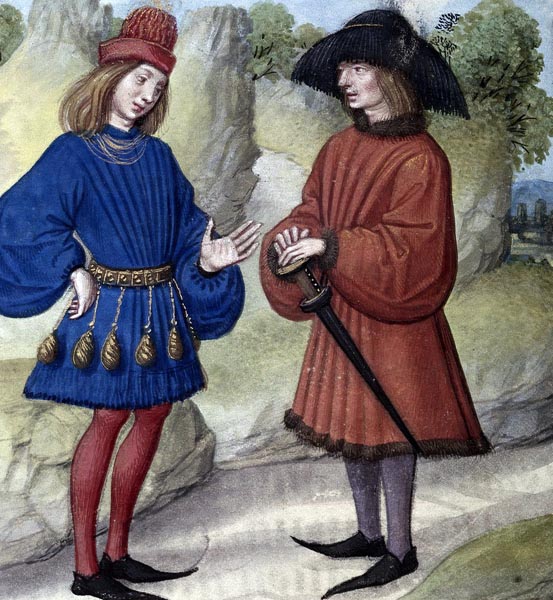
‘The Lover Seeks out Friend’
THUS I went to seek him swiftly,
And, much as Love had counselled me,
Revealed to him the barbs that I
Now felt I was surrounded by;
And of Resistance I complained
Who would gladly see me maimed,
Who’d chased Fair-Welcome away,
When he saw us speak that day
Of the rosebud, that I longed for;
And who told me that if he saw
My face in that fair place again,
For any reason, I’d suffer pain.
Yet when Friend heard, in verity,
The whole, he feared not for me.
Chapter XXV: Friend gives him good counsel
How Friend, gentle in everything,
Comfort to the Lover doth bring.
HE said to me: ‘Companion, be
Reassured, naught to fear I see.
I’ve known Resistance a fair while;
He has learnt to display his bile,
And menace and harm all those who
Have begun to love, such as you.
I found him out many moons ago,
If you have found him cruel, know
He’ll prove otherwise in the end.
I know him like the coin you spend;
For he can be mild, as if on whim,
If you flatter, and petition him.
Now I shall tell you what to do:
Simply beg him to pardon you,
And, for love and sweet accord,
Forgo this ill-will, and discord,
And then swear to him that indeed
From now on, in both word and deed,
You’ll do naught that might displease;
Tis the thing that most doth please,
Him, flattery and blandishment.’
Friend spoke well, and his intent
Was, by his words, to comfort me,
And grant the strength of will to me,
To go and see, chancing my fate,
If this Resistance I might placate.
Chapter XXVI: The Lover begs Resistance to show mercy
How the Lover met with Resistance,
And begged him, in this instance,
To desist and swallow his bile,
Humbly seeking mercy the while.
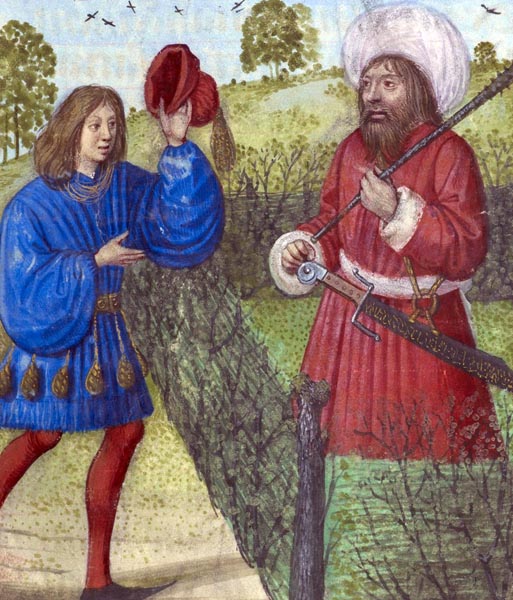
‘The Lover Begs Resistance’
TO Resistance I came, contrite,
Eager to sue for peace, but might
Not pass beyond the hedge for he
Had now denied passage to me.
I found him near, he did advance,
Menacing was his face, and stance,
Holding a thorn club in his hand;
With bowed head, I made a stand,
And said: ‘Sire, I am here to plead
For mercy, for sorry am I indeed,
If I have done aught to anger you’
For it doth weigh upon me too.
But I am ready to make amends,
However you wish, and be friends.
Love made me act so, at the start,
From whom I cannot free my heart,
For surely I have no wish to do
Aught that might discomfort you.
I’d rather suffer without cease,
Than do aught that might displease.
Now, I request that you do show
Mercy to me, and your anger so
Soften you cease to frighten me.
And I do swear, most fervently,
That if you oppose me, I will not
Commit towards you any fault,
Should you accord me the mercy
That you scarce can refuse me.
Grant me only that I may love,
Naught else I ask you to approve.
I will perform your every wish
If you will only grant me this.
And my intent you must allow,
I seek not to deceive you, now;
For, since it suits me, I will love,
Whoe’er objects, or may approve.
But my weight in silver I’d forgo
Rather than that I rouse you so.’
I found Resistance was reluctant,
Slow to abandon his discontent;
Yet my speech did so little offend,
That he pardoned me in the end.
And he replied to me: ‘In short,
Your request troubles me naught,
Nor would I seek to deny you:
Know I am not angered by you.
If you seek to love, what care I?
It makes me neither laugh nor cry.
Love forever, as long as you stay
Far away from the Rose, alway.
But I shall have no mercy on you
If ever the hedge you pass through.’
Thus did he grant me my request,
And I went and straight confessed
To Friend, who likewise did rejoice,
As a good companion and gave voice:
‘Now it goes well doth your affair,
Resistance will prove debonair,
For he is kind to many a lover,
Once his show of pride is over.
If you caught him in good humour,
He’d take pity on how you suffer.
Now you should wait and endure
Until he is feeling far less sore.
I have proven, to curb and conquer
The violent, one must wait and suffer.’
Most tenderly thus did Friend
Comfort me, who did intend
I should succeed as much as I.
So, taking leave of him, did I,
Return to the hedge Resistance
Guarded, impatient to advance,
And view the rosebud once again,
Since, no greater joy could I gain.
Resistance often sought to see
If all went on as we did agree,
And I feared his anger so much
I did not seek to reach or touch;
Rather I took pains to ensure
I followed his orders, the more
To gain his acquaintance, and so
Win him to my cause, but slow
He was to show me any mercy.
Yet many a time he did see me
Weep loudly, lament and sigh,
Since the Roses he would deny
Me, leaving me beside the hedge,
Shivering, because of my pledge.
Yet, from my countenance, he
Could see Love ruled me harshly,
And that in me there was no place
For deception, and that my face
Showed not a trace of disloyalty.
And yet, such was his cruelty,
Ne’er would he deign to relent,
Despite my tears and my lament.
Chapter XXVII: Pity and Openness plead on his behalf
How Pity then, and Openness,
Went, honourably, to address
Resistance, and aid the Lover,
Who from love did greatly suffer.
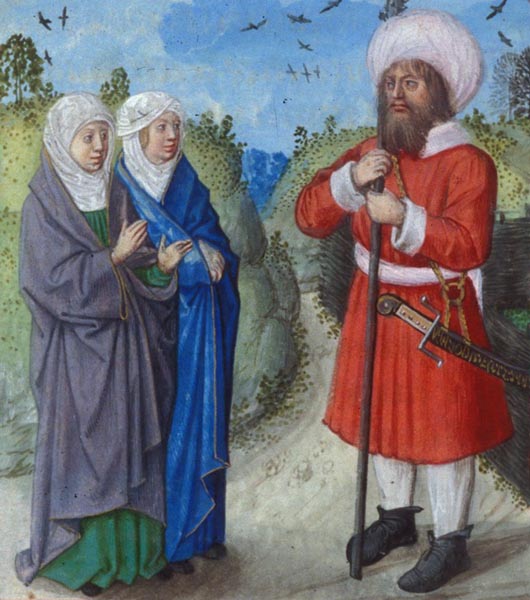
‘Pity and Openness Plead’
AS I was suffering, in great pain,
Pity and Openness, God did deign
To lead to me, now, without delay.
To Resistance they made their way,
For they both desired to aid me
If they could, and most willingly,
Since they knew I was in sore need.
Openness, to whom thanks indeed,
Was first to utter, and she said:
‘Resistance, you have sore misled
This Lover and you do him wrong,
For he has waited and suffered long.
Know tis yourself that you disgrace.
For I hear not, by God’s good grace,
That he has e’er done wrong to you.
If Love perforce make him love true,
Is it this lover you should blame
And so chastise him for that same?
More loss than you doth he sustain,
For he must suffer many a pain.
And then, Love will not consent
That of his love he may repent.
Even were you to skewer him,
He could not keep from loving.
But, how does it serve, dear sire,
That him you do trouble and tire?
If you would have the man love you
And serve as your subject, too,
Why on him then fierce war declare?
If Love holds him in his snare,
And forces him to obey you,
Must you hate him for it too?
Rather you should spare him, more
Than some vain, ignorant boor.
Tis true courtesy to advance
One who’s in sad circumstance.
Hard the heart that doth not relent,
When it meets with a supplicant.’
Then Pity spoke: ‘In verity,
Harshness conquers humility,
But harshness applied too long,
Is a felony, and a vile wrong.
Resistance, I beg you, no more
Must you seek to maintain this war,
Against the captive languishing here,
Who’s ne’er deceived Love, tis clear.
Tis my opinion that you’ve sought
To grieve him more than you ought.
Too harsh a penance he’s endured
Since ever you chose to withdraw
Fair-Welcome’s company, indeed,
For that is what he most doth need.
He was troubled enough before,
Now his grief is doubled and more;
Now he lacks Fair Welcome, he
Is ill-set and wounded mortally.
Why must you be so contrary?
Love hounds him too continually;
Such that, e’en to satisfy you,
There’s no more that he need do.
Cease then to mistreat the fellow,
For you gain naught by doing so.
Suffer Fair-Welcome to embrace
Him, and grant him a little grace:
Toward the sinner, show mercy,
For Openness agrees, and she
Begs and urges, at his behest,
That you refuse not his request;
For he’s most wicked and cruel too
Who’ll do naught to please us two.’
Then Resistance was forced to waver,
And ease his stance, in my favour.
‘Ladies,’ said he, ‘I would not dare
To refuse either, in this affair,
For that would be true villainy.
I shall grant him the company
Of Fair-Welcome, if it doth please;
All obstacles to that shall cease.’
Then swiftly to Fair-Welcome went
Openness, ever eloquent,
And said to him, most courteously:
‘Fair-Welcome you are parted sadly
From that true Lover whom you
Will now not even deign to view.
He has been both pensive and sad,
Since the moment that he last had
Sight of you; you must consider,
If you’d keep my love, this lover,
And fulfil his wishes, by and by;
Know that, between us, Pity and I,
Have but now subdued Resistance,
He who banished you to a distance.’
‘I’ll do as you wish, and willingly,’
Said Fair-Welcome, ‘tis certainly
Right, since Resistance doth agree.’
Openness sent him then to me.
Fair-Welcome began his address,
Saluting me with great sweetness,
And if he had felt anger before,
Toward me, it was there no more,
Rather he showed a fairer face,
Than e’er he had done in that place.
And, by the hand, he took me then,
And led me to that place again,
That Resistance had denied me,
Now I had leave to roam widely.
Chapter XXVIII: Fair-Welcome leads the Lover to the Rose
How Fair-Welcome doth sweetly
Conduct the Lover right joyously,
Through the hedge to view the Rose,
The sweetest thing the Lover knows.
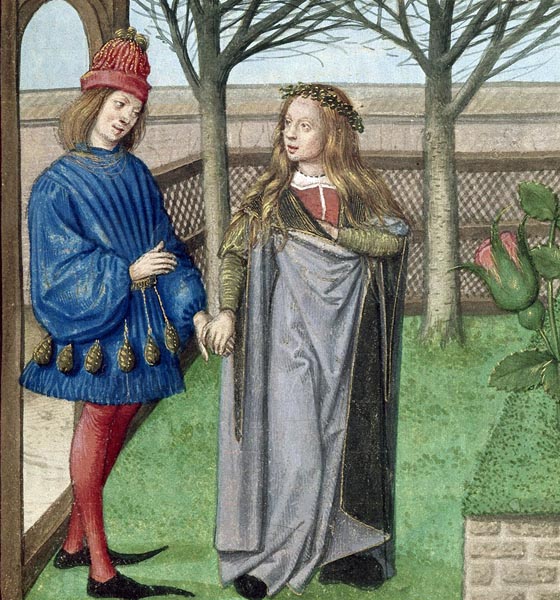
‘Fair-Welcome Leads the Lover’
NOW had I risen, in a trice,
From deepest hell to paradise;
Fair-Welcome led me everywhere,
My wish, it seemed, his every care.
And now as I approached the Rose,
I found the centre, it did enclose,
Was somewhat larger than before,
For it had grown since last I saw
Its form, the Rose was fuller there
Above, as I was pleasantly aware;
Yet it was not so open however,
That the ovary one might discover
Which did the rose-seeds enclose,
Veiled by the petals of the Rose,
That raised themselves on high,
And all that there within did lie.
She was, may God so bless her,
Far more expansive and lovelier,
Than before, more crimson still,
And I was amazed at this marvel;
And so beautiful, indeed, was she,
Love bound me ever more closely;
And the more solace I found there,
The more Love tightened his snare.
I lingered a goodly while, since I
On Fair-Welcome might now rely
For love, and for companionship;
And seeing that his good fellowship
He denied me not, nor his service,
This I requested of him, that is
A thing good to mention here:
‘Sire,’ said I, ‘my wish is clear,
For I would love, if tis not amiss,
To win but a single sweet kiss
From the Rose that breathes out
Such lovely perfume, all about;
And, if it would not displease,
I’d ask it of you, on my knees.
For God’s sake tell me if I may,
For I’d do naught to cause dismay.’
‘God help me, dear Friend,’ said he,
‘You’d not be refused it by me,
Were it not that I forever incur
Chastity’s hate and, due to her,
I dare not, for fear of offending.
She forbids me from extending
Such a boon, and granting leave
To any who such thoughts conceive.
For he who a kiss doth attain,
Can scarce in that state remain;
And he to whom one grants a kiss
Wins the best of the prize by this,
And the most pleasing part, I say,
With a pledge for the rest, on a day.
When I had heard all his answer,
I urged my request no longer,
Fearing to rouse anger anew.
One should not seek to pursue
A man too far, nor hound him;
Wine awaits the grapes’ pressing,
Nor can one fell a stately oak
By striking hard, at the first stroke.
Long time was the gift delayed,
Of the sweet kiss that I craved.
But Venus, who on Chastity
Wages war continually,
To my aid did swiftly move.
The mother of the God of Love,
She doth help many a lover;
Her beauty now did I discover.
She held a blazing torch aloft
In her right hand, that has oft
Warmed many a lady, with its flame.
She was so elegant, that same,
She seemed a Goddess, or a Fay.
From her attire, none would say
She was a nun; I’ll not detail,
Her dress, and all it did entail,
The gold thread wound about her hair,
Nor the belt that she did wear;
I’ll not linger, but do concede
That she was elegant indeed,
And yet without a trace of pride.
She drew to Fair-Welcome’s side,
And there she commenced to speak,
For of him she did answer seek:
‘Why do you resist him in this,
Fair Sire, this matter of a kiss?
For it ought not to be refused,
Since you can see that he is used
To serving, and loves faithfully.
And he has sufficient beauty
And so is worthy to be loved.
See how gracefully he moves,
How handsome, noble a man,
Open and sweet, with everyone.
And then he’s not too elderly,
Young rather, so more worthy.
There’s no lady, no chatelaine,
I’d not consider proud and vain,
If she disdained the man in this,
And so denied him a sweet kiss.
Let that kiss not be denied him,
Twould be well-employed upon him,
Since sweet breath, I think, has he,
And his mouth is far from ugly,
Rather tis formed, to my sight,
To bring sweet solace and delight;
For the lips are red, and the teeth
Are white, and there’s naught beneath
That’s marred; all are without a stain.
My counsel is that you should deign,
With reason, to grant him a kiss;
Allow it; for, believe me in this,
The longer you choose to delay,
The faster time doth slip away.’
Chapter XXIX: The Lover kisses the Rose
How the blazing torch of Venus
Aids the Lover, such that he doth
Advance to kiss the Rose, thereby
The better his love to satisfy.
FEELING the breath of Venus’ brand,
Fair-Welcome, with a wave of his hand,
The gift of a kiss now granted me;
Thus Venus’ flames brought victory,
Such that I knew no more delay,
But a sweet kiss now, straight away,
I took from the Rose; no need to ask
What joy I had of that pleasant task:
For a perfume entered my heart,
That forced my sorrows to depart,
And sweetened all the ills of love,
That for so long must bitter prove.
I was comforted, great its power;
He’s cured who kisses such a flower,
One so pleasant that smells so sweet.
So wretched a day I ne’er shall meet
That if I remember that kiss aright,
Twill not fill me with pure delight.
Nonetheless, I’ve known much annoy
And many an ill night, without joy,
Since the hour that I kissed the Rose.
Yet the sea knows not such repose
That it rests untroubled by the wind.
Love alters as the wheel doth spin,
One hour it pierces, next it soothes,
Never resting, but onward moves.
And now tis right, if I seek to name
The ways I was troubled by Shame,
Often grieved by her, and mazed;
And how indeed the walls were raised,
Of a rich keep, powerful in nature,
That Love did capture by his labour.
All that history I would pursue,
And never cease to write it true,
As long as I think it may please
That lovely lady, God give her ease,
Who better than any shall afford
When it doth please her, my reward.
Ill-Talk, who doth seek and divine
Lovers’ plans, and many a time
Repeats his account to everyone,
Took note of the fair reception,
That I received from Fair-Welcome,
Not for long could he stay dumb,
Being the son of an angry crone,
Having a tongue forever known
To be sharp, piercing and bitter;
In this, resembling his mother.
Ill-Talk began from that moment
To spy on me, and did comment
That he would give his right eye
If between Fair-Welcome and I
There was not vile acquaintance.
He made such a song and dance
About me, and Courtesy’s son,
That he roused Jealousy anon,
Who rose up, quiet no longer,
On hearing the scandal-monger,
And rising ran at Fair-Welcome,
As if she were a mad-woman,
He wishing to be elsewhere, oh,
Perchance, at Étampes or Meaux.
Chapter XXX: Jealousy scolds Fair-Welcome
Regarding the Lover, Jealousy
Scolds Fair-Welcome savagely,
Alerted by Ill-Talk, who doth
Often slander the virtuous.
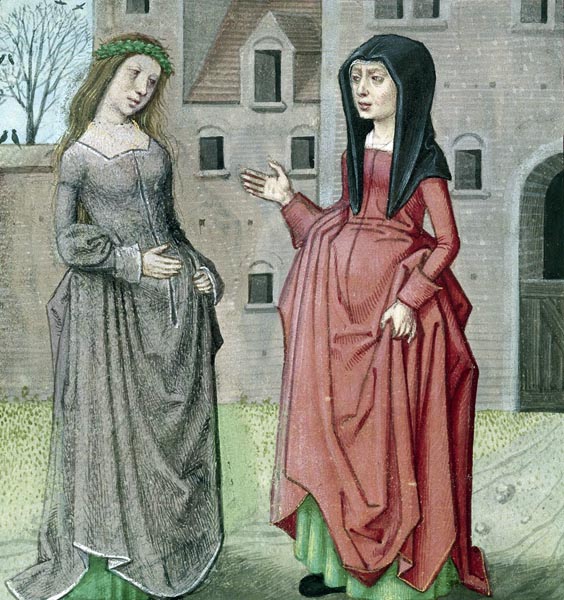
‘Jealousy Scolds Fair-Welcome’
WITH words, she savaged him thus,
‘Wretch, why are you so audacious
As to choose as your companion,
A youth I view with deep suspicion?
It seems you believe the flatteries
Dealt out by little nobodies.
Now I’ll not trust to the unsound;
Rather, I shall order you bound,
And of a tower your prison make;
For I see no other course to take.
Shame has wandered far from you,
Done little to watch over you,
Or curb your foolishness; in short,
It seems to me that she has brought
All too little help for Chastity,
In letting this lad wander free
In our enclosure and, upon her,
And myself bring such dishonour.’
Fair-Welcome had no good answer;
He’d have fled that moment, rather;
Yet she had seen him there with me,
All our acquaintance plain to see.
But, on seeing this scold arrive,
Who sore against us must strive,
I, at her fierce outcry, took fright,
And, in an instant, was in flight.
Shame, then advanced, at this,
Afraid that she had done amiss.
She was humble and innocent,
In a veil, as if she were meant
For a nun, in some nearby abbey.
And now, seeming all dismayed, she
Began to speak, her voice full low:
‘For Goodness sake, lady, give no
Credence to what Ill-Talk doth say,
That scandal-monger’s a liar, alway,
Who has deceived many a one;
For if he accuses Fair-Welcome,
Tis not the first he has accused;
Since this Ill-Talk, he is well used
To spreading lies, now and then,
About young girls and young men.
And yet, doubtless, this is no lie:
Fair-Welcome’s too free, thereby;
He’s allowed to attract those few
With whom he should have naught to do.
Yet I’ll not believe twas his intent,
Since his actions were all well-meant,
To bring about wickedness or folly.
Although it is true that Courtesy
Who is his mother, taught him to
Acquaint himself with all men too.
And she ne’er liked a foolish one.
No other fault has Fair-Welcome;
Know that, he has no other plan
Except to enjoy life as best he can,
And speak to folk and be with them.
And if I’ve been far too soft, again,
In watching and punishing the boy,
I beg that you will mercy employ.
If I’ve proved slow in doing good,
I lament the fact now, as I should,
And of my foolishness I repent.
From now on twill be my intent
To curb Fair-Welcome, as you ask,
And never seek to shirk the task.’
‘Shame,’ Jealousy cried, ‘I am afraid;
Mine is the fear of being betrayed.
For Lechery has mounted so high
It will madden all men, by and by.
No wonder if I feel doubt and care,
For Lechery reigns everywhere;
Her power never fails to grow;
Chastity is not safe, I know,
Even in a cloistered abbey.
So now a new wall I must see,
Round the Rosebushes to enclose
The whole, so naught reveals a Rose.
I’ve little faith in your wardenship,
And a better guard might yet slip;
And if I prove not careful, I fear
There would never come a year
In which I was not thought a fool;
So caution now must be my rule.
I needs must see to the thing today.
Assuredly, I shall close the way
To all those folk who come to spy
On my Roses, and deceive thereby.
Nor shall I indulge in idleness,
Till I have built a strong fortress,
To enclose the Roses all around.
I’ll build a tower on that ground,
A prison to hold Fair-Welcome,
For I am most afraid of treason.
I shall so closely guard his body,
He’ll have no power to win free,
Nor with those lads keep company
Who’d willingly dishonour me,
With sweet words flattering him.
Too many times they’ve found him
A fool, and far too easily caught;
For, as I live, all this has taught
Much ill comes of his fair-seeming.’
And now Fear arrived, all trembling;
But she was so dismayed by what
Jealousy said that she dared not
Utter a word, finding Jealousy
Was much angered, as she could see.
So she withdrew, and went apart,
While Jealousy swiftly did depart,
Leaving Fear and Shame together,
Quivering, near to one another,
Till Fear, with her brow depressed,
Her cousin Shame then addressed:
‘Shame,’ she said, ‘it troubles me
To witness such hostility,
When there is naught we can do.
For many an April, and May too,
Have passed blamelessly for us,
Yet Jealousy now despises us,
Suspicion in her every glance.
Let us now go seek Resistance,
And demonstrate to him that he
Has committed nigh on felony
In failing to take greater care
To guard all this enclosure fair.
He has left Fair-Welcome free
To work his will, quite openly.
But now he must mend his ways,
Or he’ll find, one of these days,
He’ll be forced to flee the land;
Resistance could ne’er withstand
An outright war with Jealousy,
If e’er she showed him enmity.’
Chapter XXXI: Fear and Shame chide Resistance
How Fear and Shame both go to see
Resistance, and chide him harshly,
Concerned for the Rose, since he
Has failed to guard her carefully.
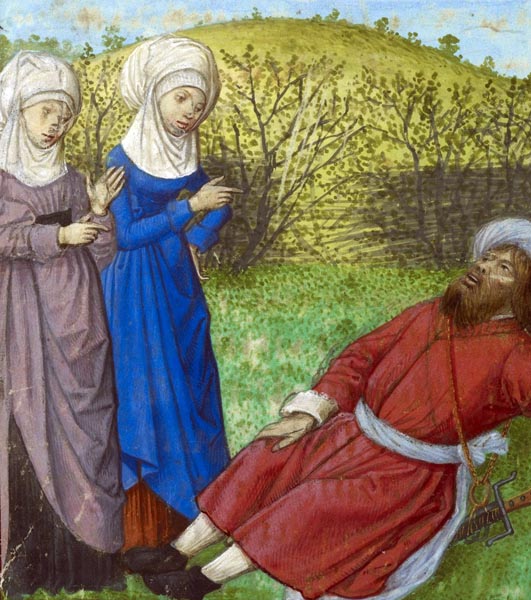
‘Fear and Shame Chide Resistance’
AND now, to progress the same,
They to Resistance swiftly came,
Finding that creature, readily,
Lying beneath a hawthorn-tree.
For a pillow he’d laid his head
On a great pile of grass instead,
So that his rest there he might take;
But Shame now forced him to wake,
And began to chide him harshly.
‘How can you sleep so uselessly,’
She said, ‘when all is gone askew?
More fools are those who’d trust you,
Less use than a sheep’s tail, God knows,
To guard the Rosebud and the Rose:
Too fond of sleep and idleness,
You should be showing forcefulness,
And dealing harshly with everyone.
Folly it was to allow Fair-Welcome
To lead that wretch to the enclosure,
A man who could bring us dishonour.
While you’re asleep we, who can do
Naught, must suffer what doth ensue
Why are you lying there still! Arise,
And close the hedge to prying eyes.
Seal every gap that you can see,
And on no stranger take pity.
It is not fitting, given your name,
If you do aught but show the same.
If Fair-Welcome’s open and sweet,
You must be cruel and use your feet,
Filled with foul anger and outrage;
The courteous wretch is never sage.
I’ve heard it said, in a proverb too,
That you can’t make, whate’er you do,
A silk purse out of a sow’s ear;
They take you for a fool, I fear,
All those you think are debonair,
Is that your wish in this affair,
To please, and do them good service?
Tis the effect of idleness,
And will get you a perfect name
For weakness, if you seek such fame,
As one who’s fooled by flattery.’
Then Fear spoke, and this said she:
‘Resistance, why, for goodness sake,
Are you, I wonder, not wide awake,
And standing guard as you ought?
Your position will be most fraught
If Jealousy’s wrath increases more
She’s harsh and cruel, as we saw,
And inclined to be quarrelsome.
Today she attacked Shame for one,
And by her menaces has driven
Fair-Welcome from this garden.
And sworn if he seeks to stay,
She’ll prison him, this very day.
Tis all through your inattention;
You’ve no backbone to mention.
I do believe you lack the courage,
And yet tis trouble you encourage;
Pain and grief will plague you so,
If Jealousy should get to know.’
First, the wretch raised his hood,
And shook himself, then he stood,
Wrinkled his brow, rolled his eyes,
Full of anger, and fierce surprise,
When he heard himself so abused.
‘It maddens me thus to stand accused,
You’ll think me outwitted, no less;
I’ve lived too long, I must confess,
If I have failed to guard this place.
Let me be spitted, forgo all grace,
If living man makes his ingress;
My heart were angered to its depths,
Should any man set foot in here.
I’d rather have two lances clear
Through the body than see it so;
Yet I’ve acted like a fool, I know.
I’ll amend my fault now for you;
I’ll not be idle, but strive anew
To defend the place I hold dear;
And if any man’s made captive here,
He’d better have gone to Pavia;
For I swear to you I shall never
As long as I live, cause you to say
I failed in my task a single day.’
Resistance made himself look tall,
And feigning fierce anger, withal,
He took a large stick in his hand
And went roaming o’er his land,
To see if he could not find a gap
That needed stopping, or mayhap
A hole; and now all had changed
For Resistance, who thus ranged,
Was fiercer than he was wont to be;
Whoe’er roused him, twas death to me.
For I lacked the means to acquire
Sight of what I did most desire.
Heart’s anger rendered me numb,
For I’d offended Fair-Welcome.
And I shake in every member,
When the fair Rose I remember,
Sight of which I once did relish
Closely, whenever I did wish.
And when I recall, after this,
How my heart, from that kiss
Received a perfume, sweet as balm,
I almost swoon, such the qualm
I feel, for my heart doth enclose
Still the sweet scent of the Rose.
And know that when I remember
That I from the Rose must sever,
Rather than live on, I would die.
Twill prove an evil hour when I
Touched the Rose to my face and eyes,
And then my lips, if Love denies
Me another touch, some fine day;
For since the taste I did essay
So much greater the covetousness
Inflaming my heart to excess.
Now tears and sighs will return,
Sleepless nights, wherein I burn,
Frissons, fierce pangs, those sorrows
That will fill my sad tomorrows.
For now I am fallen into Hell.
Ill-Talk be cursed! I know well
It was his tongue, faithless, fickle,
That has left me in this pickle!
Chapter XXXII: Jealousy’s tower
How, in a malevolent hour,
Jealousy erects a tower,
In the midst of the garden
And Fair-Welcome, doth imprison;
That sweet child she doth enclose,
Because the Lover kissed the Rose.
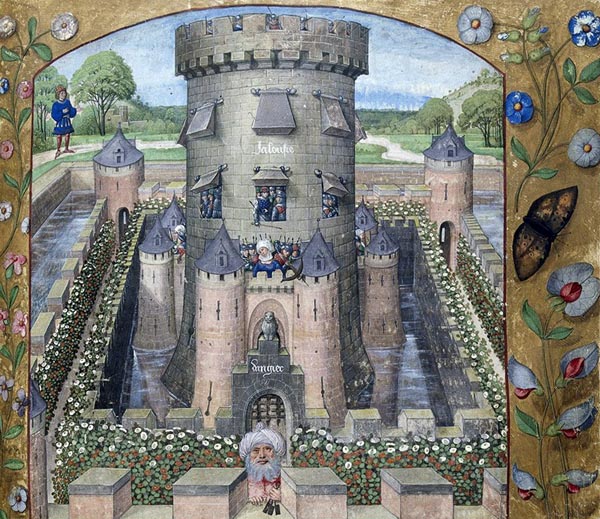
‘Jealousy’s Tower’
NOW it is right that I tell you
Of all that Jealousy sought to do,
Driven by her vile suspicion.
There was not a single mason
Or brave workman in all the land
She did not send for, and command
To dig a ditch around the Roses,
Which if paid for, one supposes,
Had cost, of silver coin, a heap.
Above this moat, wide and deep,
They built walls of quarried stone,
And not on shifting ground, prone
To slip and slide, but solid rock.
And the foundations, block by block,
From the base, filled all that drop,
While they were narrower at the top,
So that the walls were very strong.
Those walls were built to run along
The moat, to form a perfect square,
Each side two hundred yards there
Of stone, as broad as it was long.
The turrets too were fine and strong,
Richly crenellated and made,
Likewise, of stone squarely laid.
There were four, one to a corner,
And most difficult to conquer;
Others at the four gates did lie,
Where the wall was broad and high.
The gate at the front was easily
Defended, just as it ought to be.
Those at the sides, and at the rear,
No catapult-strike they did fear.
There were portcullises also,
To cause those outside sorrow,
Trapping them, ere they fought clear,
If they dared to venture near.
In the midst of this enclosure,
The makers set a lofty tower;
Master-builders were they all;
On all their skill they did call,
No tower so fine, strong and tall;
No engine might breach that wall,
No missile could that tower conquer,
For they had tempered the mortar
With strong vinegar and quicklime.
The stone was from a local mine,
That they used for the foundation,
Long as diamond its duration.
The tower was completely round,
And none so rich could be found,
Nor one better equipped within.
And it stood there proud, within
The bailey that did it surround;
And on the intervening ground
The Rose-bushes, thickly planted,
Whose fair Roses so enchanted.
Within the castle were machines,
Great catapults, and like means
Of waging war; there mangonels
You’d have seen over the crenels,
And at the apertures, all around,
Arbalests you would have found,
That no armour could withstand.
Who close to the walls did stand,
His action was mere foolishness.
Beyond the moat, there lay no less
Strong a wall, round the enclosure;
No horse might its low embrasures
Dare, and thereby reach the moat,
Without some encounter of note.
In this castle, I describe, anon
Had Jealousy placed a garrison.
Resistance he carried the key
To the eastward opening gate, and he
Had, as far as I’m aware,
Thirty followers with him there.
Shame guarded the right-hand gate,
To the south and, wise to fate
I may tell you, had full many
A follower, willing as any.
Fear had a large troop to hand,
And the third gate did command,
To the left side, and the north,
From which she could issue forth,
Yet Fear will never feel secure
Unless she has locked the door;
And she opens it infrequently;
For if two crickets she doth see,
Leaping, or hears the wind blow,
Terror and panic do grip her so.
Ill-Talk, may God curse him, he
Had soldiers there from Normandy,
And guarded the west door behind.
But know that one could also find
Him at the other three doors, for he
Went to and fro, quite frequently.
At night when he guarded the wall
He’d play his pipes, and make all
His trumpets and his horns cry out.
Now, tales and lays he was about,
Now, he would improvise to suit,
Employing then the Cornish flute.
Or to that same flute sing anew,
How he’d ne’er found a woman true.
‘Ne’er a one but smiles,’ sang he,
‘When she hears talk of lechery.
One’s a whore; one paints her face,
One’s a fool, one a sad disgrace;
This poor girl’s as mad as ever,
And this one she’ll talk forever.’
Ill-Talk who doth spare none,
Found some fault in everyone.
Jealousy, may God confound her,
Had also garrisoned the tower!
For she advises her close friends
And to some place she then sends
Them, forming a large garrison.
Here Fair-Welcome was in prison,
Shut in the tower above, on high,
The door barred, and there did lie,
Lacking the power to win free.
An old crone, God shame her, he
Had to guard him, such her station;
She had no other occupation
Than to keep watch on him and see
He refrained from acting foolishly.
None could deceive her by scheming,
Neither by signature, nor seeming,
There was no trick that she knew not,
From her youth she had not forgot
Those things good and unpleasant,
Love grants to his every servant.
Fair-Welcome kept silence, alone,
For he was afraid of that old crone,
Greatly fearing to make a move,
She might see, and so disapprove
Of some folly he might advance;
For she knew all the ancient dance.
Chapter XXXII: The Lover laments his fate
AS soon as Jealousy had taken
And imprisoned Fair-Welcome,
And the crone had locked the door,
She now thought herself secure:
Her castle was strong, she knew,
A fact that gave her comfort too.
She need not fear that any would
Attempt the Rose or the Rosebud,
So close the Roses were contained;
Waking or sleeping she maintained
A feeling of security.
But, beyond the walls, pity me,
Delivered o’er to pain and woe;
For indeed if any did know
The life I led, they’d feel pity.
Love knew well how to sell to me
All the good things he had loaned.
I’d thought all those goods I owned,
But now he made me pay for them,
And I was in greater trouble then,
Because of the joy that I had lost,
Now being forced to count the cost.
And what more can I say to you?
For I resemble the peasant who
Casts his seed upon the ground
And rejoices when he has found
It flourishes, each shoot well-made,
Yet, before he can reap a blade,
Such is the weather, cloud doth rise
And a storm doth fill the skies,
Just as the ears begin to sprout,
Harming the crop, inside and out;
The harvest fails, and all’s effaced,
All of that hope too soon embraced.
And now I felt the same frustration,
My hope was lost, my expectation.
For Love had advanced me so well,
That I had already begun to tell,
Fair-Welcome each private thought,
Who was ready for all I brought,
And thus received it willingly.
But Love is so fickle, you see,
That he has robbed me in an hour
Of all I thought was in my power.
Tis as it is with Fortune who
Sets discontent in our hearts, anew,
Or caresses; then shows her power
And changes her aspect in an hour;
One hour she flatters, another spurns,
For Fortune has a wheel that turns,
And when she wishes she can raise
The low on high, and there he stays
Until that fellow who sits on high
She drowns in the mud, just as I.
For alas, tis I who know that fall!
Ill was it, when I beheld that wall
And that moat that I dare not pass,
For I have no joy or good, alas,
Since Fair-Welcome is in prison.
For all my joy and my salvation
Is wholly in him, and in the Rose
That the walls do now enclose.
And he must issue from his cell,
If ever Love wills that I be well,
For none other would I employ
To bring me honour, health, and joy:
‘Ah, Fair-Welcome, my sweet friend,
If you your prospects cannot mend,
Keep me at least within your heart,
Suffer it not that, by her art,
Jealousy, both savage and rude,
Condemns your heart to servitude,
As she has your body; prove stout,
And if she punishes you without,
Keep you a heart of steel within,
So, by torment, she cannot win.
If your body in prison remain,
Take care your heart loves me; again,
A true heart does not cease to love,
Because of blows, nor doth it move.
If Jealousy prove harsh toward you,
Causing you pain, and injury too,
Be you just as harsh toward her,
By the resistance you show there,
Take revenge, at least in thought,
If otherwise you can do naught.
For were you to do as I bade,
I’d consider myself well paid.
Yet my anxiety is great,
That you’ll not thus resist your fate,
Rather you’ll feel ungrateful now
Because through me fate doth allow
You to be held in that high tower.
Yet twas not for aught in my power,
No wrong toward you have I done,
For I have said naught to anyone
That should have been kept well-hid.
Rather, God help me, all we did
Lies heavier upon me than you
And so my penance is greater too,
Greater than anyone can say.
With anger I almost melt away,
When all my loss, I remember,
Which is so great, and consider
How fear and pain, with every breath
Must bring me closer to my death.
Alas! I should indeed feel fear,
Knowing that every slanderer,
And envious traitor, out of envy,
Proves eager to deal me injury.
Ah, Fair Welcome, I know, tis true,
That they are ready to mislead you,
So that you may, when once belied,
To their rope be swiftly tied.
Perchance already it may be so,
For I know not how things do go;
But I am now deeply afraid
Lest you’ve forgot me, sore dismayed,
Abandoned here, in sorrow and pain;
Nor shall I find comfort again
If I have lost all your good-will;
Small faith I have in others still;
If, perchance, tis lost to me there,
Then will my ending be despair.
I’ve no comfort to succour me.
Ah, dear heart, he who doth see
But a day a week, your face again,
Finds that enough to ease his pain.
Yet to see you, I know no way
On this or any other day!’
Chapter XXXII: Pity and her company arrive to save the Lover
AND there was I, in misery,
When Lady Pity I did see
Near the tower, who with her art,
Often lightens many a heart.
She began to comfort me anew,
Saying: ‘Friend, to bring to you
Solace, and lighten your burden,
Have I come into this garden,
Bringing here my Lady Beauty,
Fair-Welcome, and true Loyalty,
For distressed we’ve issued hence
From the tower, with Innocence,
And Fair Glances; true, tis high,
But loyal hearts faint not thereby,
Though tis death that they may reap.
Jealousy lies there fast asleep;
Thus it was we escaped from her.
Trouble we had, and bitter care,
For Fear who is frightened alway
Had locked the door, mute, I say,
Listening to all that might be said,
For Ill-Talk she doth deeply dread;
And she knew not what to do there.
But Love, the brave and debonair,
Who e’er brings comfort to his own,
Mischievously oped the lock alone,
Despite what Fear might have heard.
If Ill-Talk had known what occurred,
There was naught to be done there,
But golden-haired Venus, the fair,
Drawing the bolts, now set us free.’
Once they were seated near to me,
All my sorrow fled, instantly;
For from her refuge Lady Beauty
Granted the sweet Rosebud to me,
And I received it most willingly,
As mine, and just as suited to me
As aught indeed could ever be.
And there in true delight we played,
Of fresh grass our couch was made,
Covered with petals from the rose;
On sweet kisses our lips did close,
In sweet transports, in deep delight
Thus we passed all that long night,
Though it seemed brief indeed to me.
Then, with the dawn, we instantly
Woke, and thus we two did arise,
But we sorrowed, sighed sweet sighs,
That we indeed must part so soon.
For Beauty now did change her tune,
She came to claim the Rose from me,
And despite myself, I must so agree.
Yet nevertheless that sweetest Rose,
Was kind to me, you may suppose;
Before the moment we must part,
She gave me sweet leave to depart.
Then came Beauty to me humbly,
And said to me, all smilingly:
‘Now may Jealousy watch on high,
And raise her walls towards the sky,
And thick the hedge with sharp briars,
Defending the garden till she tires;
For we have tasted of true delight;
In vain gainst us doth she not fight?
Fair sweet friend, as the saying has it,
Each serves according to their merit;
Seek ever to love without deceit,
If your heart is whole and complete,
And you’ll forever win the Rose,
Ne’er so secure, as folk suppose.’
Straight to the tower, all elegantly,
They all returned, most secretly;
Now I depart, my debt redeemed,
For such is the dream that I dreamed.
The End of Guillaume de Lorris’ Romance of the Rose
Afterword: The Continuation
Jean de Meung appears to have suppressed the last eighty lines of the text, in order to begin his Continuation, translated elsewhere, from that point (‘despair’). Though the eighty lines may not be by Guillaume, and may have been inserted in order to provide a satisfactory conclusion, the expanded text proves satisfying in its own right.
The End of the Manuscript Addition